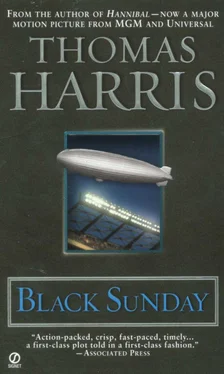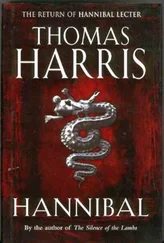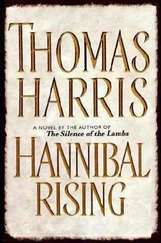She had slept on a cot in the New Jersey hospital room for four nights. She could not leave him for fear he would rave about the mission. And he had raved, but it was about Vietnam and persons she did not know. And about Margaret. For one entire evening he had repeated, “Jergens, you were right.”
She did not know if his mind was gone. She knew she had twelve days until the strike. If she could salvage him, she would do it. If not—well, either way he would die. One way was no worse than the other.
She knew Fasil was in a hurry. But hurrying is dangerous. If Lander was unable to fly and Fasil’s alternate arrangements did not suit her, she would eliminate Fasil, she decided. The bomb was too valuable to waste in a hastily contrived operation. It was far more valuable than Fasil. She would never forgive him for trying to get out of the actual operation in New Orleans. His weaseling had not been the result of a failure of nerve, as was the case with the Japanese she shot before the Lod airport strike. It was a result of personal ambition, and that was much worse.
“Try, Michael,” she whispered. “Try very hard.”
Early on the morning of January 1, federal agents and local police fanned out to the airports that ringed New Orleans-Houma, Thibodaux, Slidell, Hammond, Greater St. Tammany, Gulfport, Stennis International, and Bogalusa. All morning long their reports filtered in. No one had seen Fasil or the woman.
Corley, Kabakov, and Moshevsky worked New Orleans International and New Orleans Lakefront airports with no success. It was a glum drive back toward town. Corley, checking by radio, was told that all reports from Customs at entry points around the country and all reports from Interpol were negative. There had been no sign of the Libyan pilot.
“The bastard could be going anywhere,” Corley said as he accelerated onto the expressway.
Kabakov stared out the window in sour silence. Only Moshevsky was unconcerned. Having attended the late-late show at the Hotsy-Totsy Club on Bourbon Street the previous evening instead of retiring, he was asleep on the backseat.
They had turned on Poydras toward the federal building when, like a great bird flushed from hiding, the helicopter rose above the surrounding buildings to hover over the Superdome, a heavy square object slung close under its belly.
“Hey. Hey. Hey, David,” Corley said. He leaned over the wheel to look up through the windshield and slammed on his brakes. The car behind them honked angrily and pulled around them on the right, the driver’s mouth working behind his window.
Kabakov’s heart leaped when he saw the machine, and it was still pounding. He knew it was too early for the strike, he could see now that the object hanging under the big helicopter was a piece of machinery, but the image fit the imprint in his mind too well.
The landing pad was on the east side of the Superdome. Corley parked the car a hundred yards away, beside a stack of girders.
“If Fasil is watching this place, he’d better not recognize you,” Corley said. “I’ll get us a couple of hardhats.” He disappeared into the construction site and returned in minutes with three yellow plastic helmets with goggles.
“Take the field glasses and move up into the dome, where that opening overlooks the pad,” Kabakov told Moshevsky. “Keep out of the sunlight and sweep the windows across the street, anywhere high, and the perimeter of the loading area here.”
Moshevsky was moving as he spoke the last word.
The ground crew trundled another load onto the pad, and the helicopter, rocking gently, began its descent to pick it up. Kabakov went into the construction shack at the edge of the pad and watched through the window. The loadmaster was shielding his eyes from the sun with his hand and talking into a small radio as Corley approached him.
“Ask the chopper to come down, please,” Corley said. He cupped his badge so only the loadmaster could see it. The loadmaster glanced at the badge and then at Corley’s face.
“What is it?”
“Would you ask him to come down?”
The loadmaster spoke into the radio and yelled at the ground crew. They rolled the big refrigeration pump off the pad and turned their faces away from the blowing dust as the machine gingerly touched down. The loadmaster made a cutting motion with his hand across his wrist and beckoned. The big rotor slowed and began to droop.
The pilot swung himself out and dropped to the ground in one motion. He wore a Marine flight suit, weathered until it was almost white at the knees and elbows. “What is it, Maginty?”
“This guy wants to talk to you,” the loadmaster said.
The pilot looked at Corley’s ID. Kabakov could detect no expression on his dark brown face.
“Can we go in the shack? You too, Mr. Maginty,” Corley said.
“Yeah,” the loadmaster said. “But look, this eggbeater costs the company five hundred dollars an hour. Can we sort of hurry this up?”
In the littered construction shack, Corley took out the picture of Fasil. “Have you—”
“Why don’t you introduce yourselves first,” the pilot said. “That’s polite, and it’ll only cost Maginty here twelve dollars’ worth of time.”
“Sam Corley.”
“David Kabakov.”
“I’m Lamar Jackson.” He shook their hands solemnly.
“It’s a matter of national security,” Corley said. Kabakov thought he detected a glint of amusement in the pilot’s eyes at Corley’s tone. “Have you seen this man?”
Jackson’s eyebrows raised as he looked at the picture. “Yeah, three or four days ago, while you were rigging the sling on that elevator hoist, Maginty. Who is he anyway?”
“He’s a fugitive. We want him.”
“Well, stick around. He said he was coming back.”
“He did?”
“Yeah. How did you guys know to look here?”
“You’ve got what he wants,” Corley said. “A helicopter.”
“What for?”
“To hurt a lot of people with. When is he coming back?”
“He didn’t say. I didn’t pay too much attention to him to tell you the truth. He was kind of a creepy guy, you know, coming on friendly. What did he do? I mean you say he’s bad news—”
“He is a psychopath and a killer, a political fanatic,” Kabakov said. “He has committed a number of murders. He was going to kill you and take your helicopter when the time came. Tell us what happened.”
“Oh, Christ,” Maginty said. He mopped his face with a handkerchief. “I don’t like this.” He looked quickly out the door of the shack, as though he expected the maniac momentarily.
Jackson shook his head like a man making sure he is really awake, but when he spoke his voice was calm. “He was standing by the pad when I came over here for a cup of coffee. I didn’t particularly notice him, because a lot of people like to watch the thing, you know. Then he started asking me about it, how you make a lift and all, what the model designation was. He asked if he could look inside. I said he could look in through the side door of the fuselage, but he shouldn’t touch anything.”
“And he looked?”
“Yeah, and let me see, he asked how you go back and forth from the cargo bay to the cockpit. I told him it’s awkward, you have to lift one of the seats in the cockpit. I remember I thought it was a funny question. People usually ask, like, how much will it pick up and don’t I get scared it will fall. Then he told me he had a brother who flies choppers and how his brother would love to see it.”
“Did he ask you if you work on Sundays?”
“I was getting to that. This dude asked me three times if we were going to work through the rest of the holidays and I kept telling him yeah, yeah. I had to go back to work, and he made a point of shaking hands and all.”
Читать дальше












